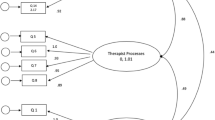Abstract
Interpretations in three psychodynamic therapy groups were rated according to Yalom's typology. Results indicated that here-and-now interpretations were employed over four times as often as historical ones. Outcome results, as measured by the DSM-III-R, indicated that interpretations of a client's present patterns of behavior were most effective in changing pathology, followed by interpretations of the impact of the client's behavior on others, then by historical interpretations. Interpretations of motivation tended to make clients worse. Client session satisfaction ratings demonstrated the same pattern as the outcome results.
Similar content being viewed by others
References
American Psychiatric Association (1987).Diagnostic and statistical manual of mental disorders (Vol. 3, rev. ed.). Washington DC: APA.
Bibring, E. (1954). Psychoanalysis and the dynamic psychotherapies.Journal of the American Psychoanalytic Association, 2, 745–770.
Bergin, A. E., & Lambert, M. J. (1978). The evaluation of therapeutic outcome. In S. L. Garfield & A. E. Bergin (Eds.),Handbook of psychotherapy and behavioral change: An empirical analysis. New York: Wiley.
Crits-Christoph, C., Cooper, A., & Luborsky, L. (1988). The accuracy of therapists' interpretations and the outcome of dynamic psychotherapy.Journal of Consulting and Clinical Psychology, 56, 490–495.
Flowers, J. V. (1987). Client outcome as a function of agreement or disagreement with the modal group perception of curative factors in short-term structured group psychotherapy.Internationaljournal of Group Psychotherapy, 37, 113–118.
Flowers, J. V., & Booraem, C. D. (in press). Four studies toward an empirical foundation for group therapy.Journal of Social Science Research, in press.
Haraway, N., Dittman, A., Raush, H., Bordin, E., & Rigler, D. (1955). The measurement of depth of interpretation.Journal of Consulting Psychology, 19, 247–253.
Kubie, L. (1952). Problems and techniques of psychoanalysis validation and progress. In E. Pumpian-Mindlin (Ed.),Psychoanalysis as a science. Stanford, CA: Stanford University Press.
Speisman, J. (1959). Depth of interpretation and verbal resistance in psychotherapy.Journal of Consulting Psychology, 23, 93–99.
Yalom, I. D. (1975).The theory and practice of group psychotherapy. New York: Basic Books.
Author information
Authors and Affiliations
Rights and permissions
About this article
Cite this article
Flowers, J.V., Booraem, C.D. The effects of different types of interpretation on outcome in group psychotherapy. Group 14, 81–88 (1990). https://doi.org/10.1007/BF01457402
Issue Date:
DOI: https://doi.org/10.1007/BF01457402



